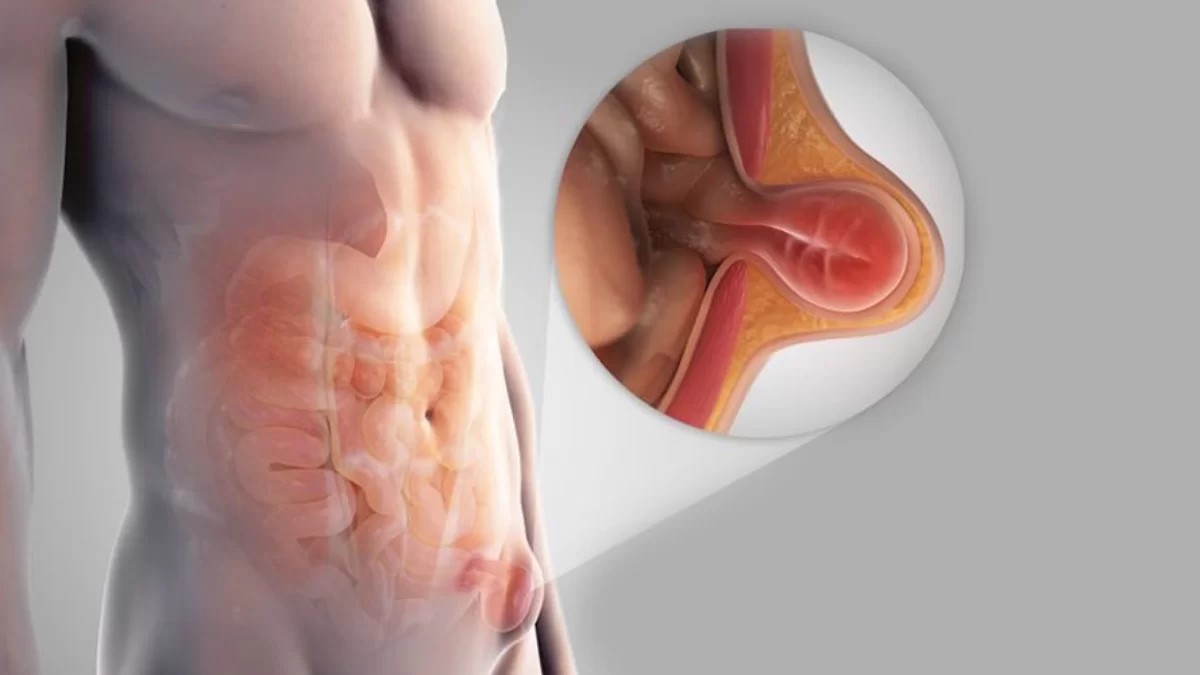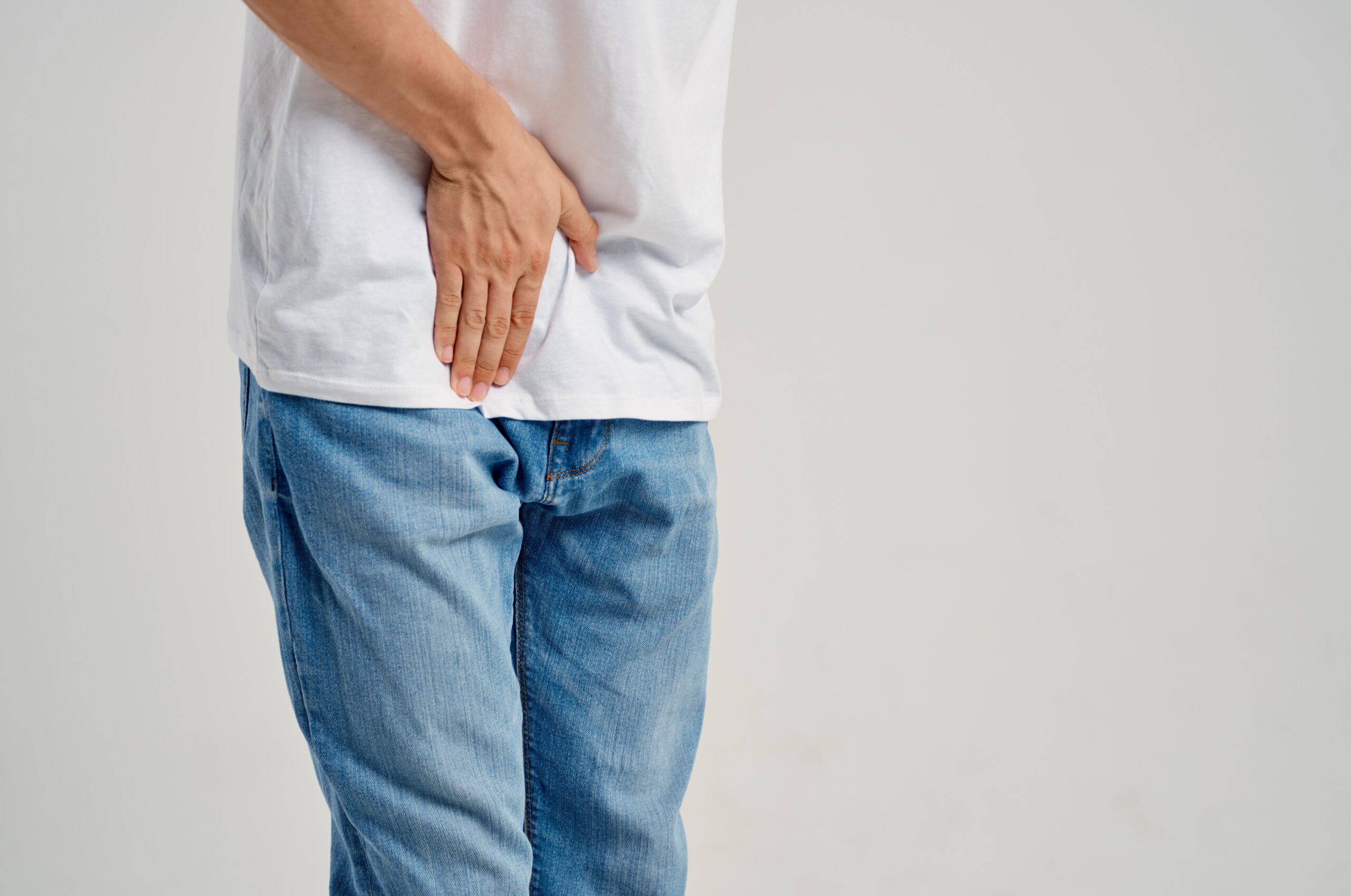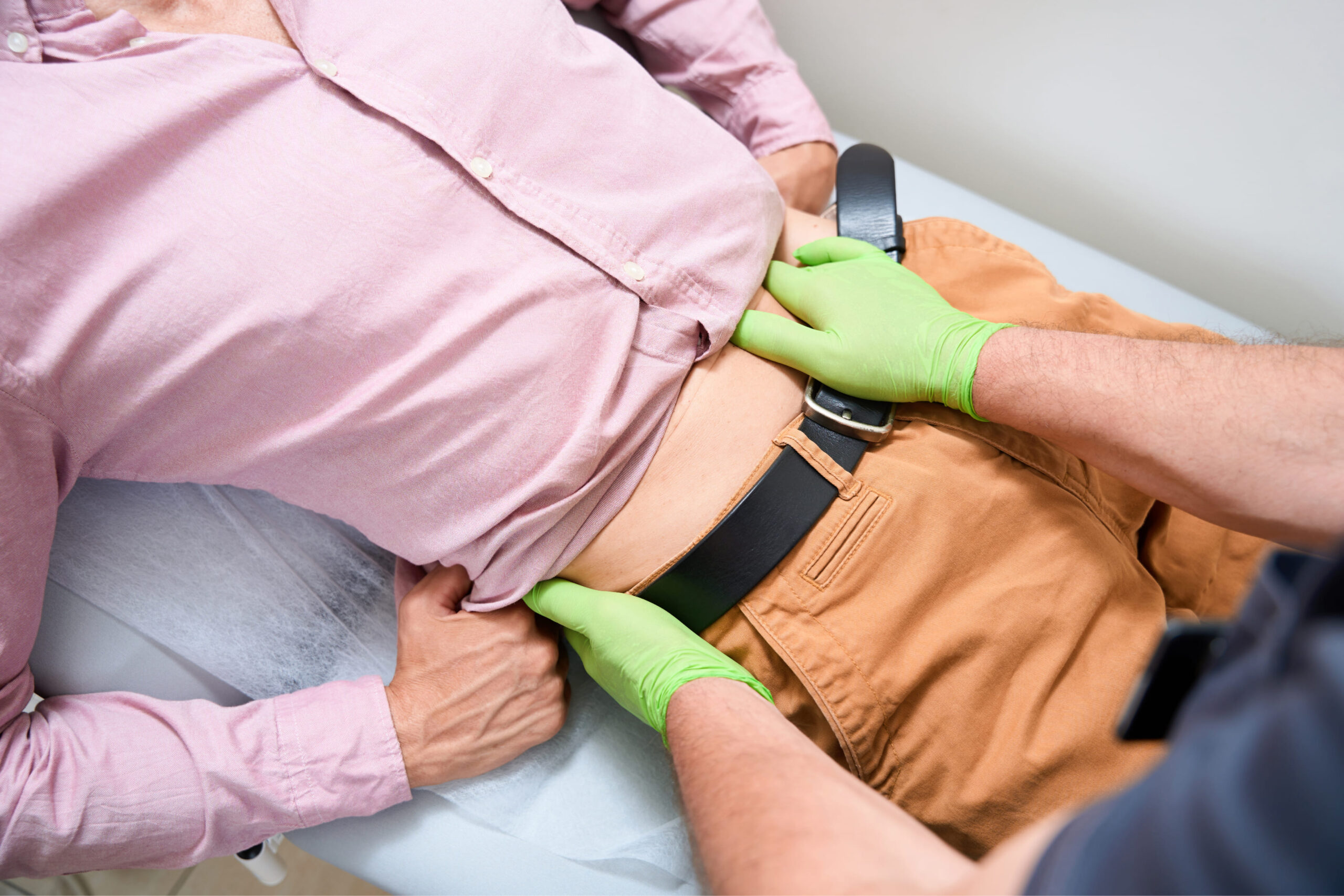Are Your Symptoms
Affecting Your Quality Of Life?
Consult our MOH-accredited specialist for an accurate diagnosis & personalised treatment plan today.




An inguinal hernia occurs when a portion of the intestine or abdominal tissue protrudes through a weak spot in the abdominal muscles, specifically in the inguinal canal.
This type of hernia appears as a bulge in the groin or scrotum area and is one of the most common hernias, particularly in men. It occurs when the contents of the abdominal cavity push through a weak point or tear in the lower abdominal wall, usually following the path of the inguinal canal.
Inguinal hernias are classified into two types based on their cause and the path they take through the inguinal canal.
An indirect inguinal hernia happens when a passage in the abdominal wall, called the inguinal canal, doesn’t close properly before birth. This allows parts of the intestines or other abdominal contents to slip into the canal. This type of hernia is more common in males and often shows up during childhood or early adulthood. For males, it can extend into the scrotum, while in females, it might extend into the labia.
A direct inguinal hernia usually develops in adults as the abdominal muscles weaken over time. Unlike indirect hernias, direct hernias don’t follow the same path through the inguinal canal. Instead, they push directly through the abdominal wall near the canal. This type of hernia is more common in older adults and can be triggered by activities that put pressure on the abdomen, like heavy lifting, chronic coughing, or straining during bowel movements.
Symptoms of an inguinal hernia can vary, but common signs include:
Inguinal hernias can be caused by muscle weakness and strain, with contributing factors including:
Some people are born with a weakness in their abdominal muscles due to an incomplete closure of the inguinal canal during foetal development. This weak spot can increase the risk of developing a hernia later in life.
A persistent cough, such as from smoking or lung diseases, puts repeated pressure on the abdominal wall, weakening the muscles over time, making it easier for a hernia to form.
Lifting heavy objects repeatedly can strain and weaken the abdominal muscles. Increased pressure inside the abdomen can push tissue through a weak spot in the abdominal muscles, potentially leading to a hernia.
Chronic constipation or straining during bowel movements increases pressure on the abdominal wall, which can result in or worsen a hernia.
The growing uterus puts additional pressure on the abdominal wall, which, in the later stages of pregnancy, can stretch and weaken the muscles, increasing the risk of hernias.
As you age, your muscles lose strength and elasticity, including those in your abdominal wall, increasing the risk of developing hernias because they are less able to withstand pressure and strain.

A physical examination is the first step in diagnosing an inguinal hernia, where the doctor inspects the groin area for a visible bulge. The doctor will also palpate the area around the bulge and may ask the patient to stand up and cough or strain to assess the size and nature of the hernia. The doctor may try to gently push the hernia back into the abdomen to see if it is reducible, which helps determine the type and severity of the hernia.
If the hernia isn’t clearly visible or the doctor needs more information, they may order imaging tests:
Treatment for an inguinal hernia is determined by its size and the severity of the symptoms and includes both non-surgical and surgical options.
Non-surgical treatments only help to manage symptoms and discomfort associated with inguinal hernias, as well as prevent them from worsening.Where possible, surgery is still advised over conservative treatment.
Surgery is the only treatment option for inguinal hernias. Treatment options include:
This is the traditional method for repairing a hernia. The surgeon makes a single incision in the groin area to access the hernia. The protruding tissue is then gently pushed back into the abdomen, and the weakened area of the abdominal wall is stitched up. To strengthen the area and prevent the hernia from coming back, a synthetic mesh is often used. This surgery is usually chosen for larger hernias or when the hernia is causing significant pain or other problems.
Laparoscopic surgery is a less invasive option that involves making several small cuts instead of one large one. A tiny camera (laparoscope) and special surgical tools are inserted through these small incisions to repair the hernia using a synthetic mesh. This method is often recommended if you want a quicker recovery with less pain afterward. It’s also a good choice for people who have hernias on both sides or who have had hernias come back after previous surgery.
If a hernia becomes strangulated, meaning that the blood supply to the trapped tissue is cut off, emergency surgery is necessary. This condition is very serious and requires immediate attention. The surgeon will remove the strangulated tissue and repair the hernia. If not treated right away, a strangulated hernia can lead to tissue death and other severe complications.
Consult our MOH-accredited specialist for an accurate diagnosis & personalised treatment plan today.

Preventing an inguinal hernia requires lifestyle changes and precautions. Maintaining a healthy weight through a balanced diet and regular exercise reduces pressure on the abdominal wall. Proper lifting techniques, such as bending at the knees, can help prevent abdominal muscle strain.
Adequate fibre and hydration can help to reduce strain during bowel movements. Quitting smoking, which contributes to chronic cough, can also lower abdominal pressure. Strengthening the abdominal muscles with regular exercise can help support the abdominal wall and lower the risk of hernias.

MBBS (S’pore)|
M.Med (Surgery)|
MRCS (Ireland)|
FRCS (Edin)|
王健名医生
Dr. Calvin Ong is a Senior Consultant with more than 15 years of surgical experience. He specializes in colorectal and general surgery, performing minimally invasive as well as advanced robotic surgeries for benign and malignant colorectal conditions, including inflammatory bowel disease, pelvic floor disorders, colorectal cancer, and hernia repair. He is dedicated to providing high-quality, personalised care for his patients.
Dr. Ong graduated with a Bachelor’s degree in medicine and surgery from the National University of Singapore in 2008 and completed his Masters of Medicine (Surgery) at the same institute. He finished his advanced specialist training in 2016 and became a fellow of the Royal College of Surgeons of Edinburgh.
For Singaporeans, Singapore Permanent Residents and Foreigners. Please speak to our friendly clinic staff about using your insurance plans.

*Extended Panel
Farrer Park Medical Centre
#14-12, 1 Farrer Park Station Road
Singapore 217562
Appointment : (65) 6643 9922
Urgent Care : (65) 8181 2311
Monday to Friday : 9AM – 6PM
Saturday : 9AM – 1PM
Sunday & Public Holidays : By Appointments
Mount Alvernia Hospital
#08-62, Medical Centre D
820 Thomson Road
Singapore 574623
Appointment : (65) 6643 9922
Urgent Care : (65) 8181 2311
Monday to Friday : 9AM – 6PM
Saturday : 9AM – 1PM
Sunday & Public Holidays : By Appointments
Mount Elizabeth Novena Specialist Centre
#10-48/49, 38 Irrawaddy Road
Singapore 329563
Appointment : (65) 6643 9922
Urgent Care : (65) 8181 2311
Monday to Friday : 9AM – 6PM
Saturday : 9AM – 1PM
Sunday & Public Holidays : By Appointments
Parkway East Hospital
#05-08, 319 Joo Chiat Place
Singapore 427989
Appointment : (65) 6643 9922
Urgent Care : (65) 8181 2311
Monday to Friday : 9AM – 6PM
Saturday : 9AM – 1PM
Sunday & Public Holidays : By Appointments
Gleneagles Medical Centre
6 Napier Road #06-16
Singapore 258499
Appointment : (65) 6643 9922
Urgent Care : (65) 8181 2311
Monday to Friday : 9AM – 6PM
Saturday : 9AM – 1PM
Sunday & Public Holidays : By Appointments
If left untreated, an inguinal hernia can lead to complications such as incarceration (when the hernia becomes trapped and cannot be pushed back in) or strangulation (when the blood supply to the herniated tissue is cut off). These complications can cause severe pain and require emergency surgery.
Not always. In some cases, particularly when the hernia is small and asymptomatic, a doctor may recommend regular monitoring. However, surgery is often necessary if the hernia is causing significant discomfort or complications.
A few weeks of rest and limited activity are usually required following hernia surgery. Patients should avoid heavy lifting and strenuous activities during this time. Most people can return to normal activities within 4 to 6 weeks, but this can vary depending on the individual and the type of surgery performed.
Preparing for inguinal hernia surgery involves following your doctor’s instructions, which may include fasting before the procedure and making arrangements for someone to drive you home afterwards. Inform your doctor about any medications you are currently taking, as some may require adjustments prior to surgery.